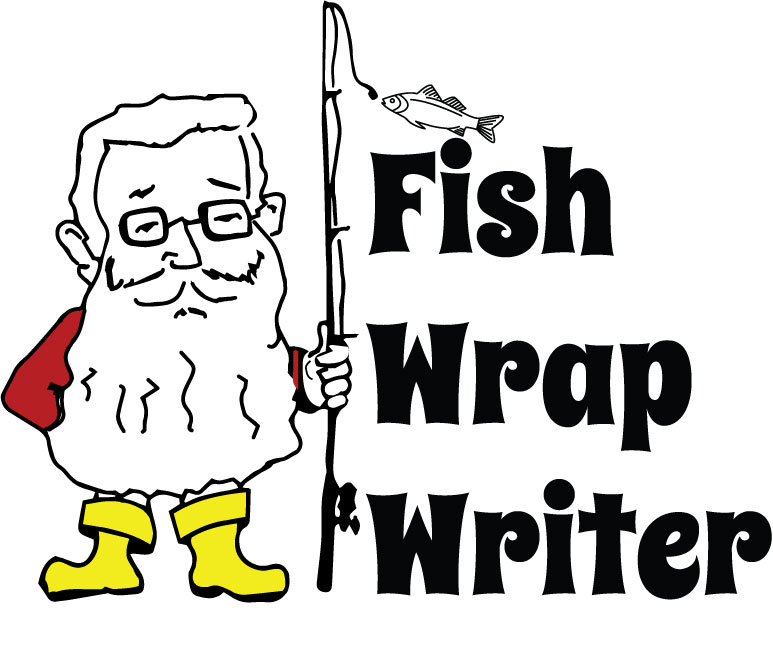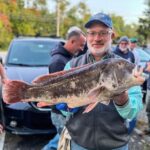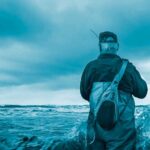Our Governor Chafe, that’s with one F, was in town Friday last, declaring squid to be our official dinner starter and to cut the cheesy blue ribbon at the new Galilee boat ramp. For starters, plenty are the questions and insufficient is the page space, to determine how, in the midst of our everlasting statewide economic embarrassment, how exactly sautéed calamari made this year’s legislative docket. No offence is directed towards our strong and valuable squid fleet, which landed some 23.5 million pounds worth, according to the General Assembly, around $18.5 million. If such a thing was of paramount importance, there may have been a more suitable namesake to reflect our states economic situation, but we probably can’t eat the burrowing beetle. Who forgot to invite the Fabulous Calamari Brothers to play the ceremony?
Over on the ramp and with some pomp for different circumstance, our legislative detail presented words of thanks to the many coordinating parties who funded, engineered and constructed this two-lane, floating dock, cooler accessible, handicap friendly, built to last boat ramp. Narragansett Dock Works was the contractor, receiving $723,814, seventy-five per cent of which was collected through the U.S. Fish and Wildlife Service Sport Fish Restoration program and $100,000.00 from RI Salt Water Fishing License fees. Jack Reed, our soft-spoken go-to Senator, who spends as much time in Washington as he does bringing home help and aid to our little state, spoke on a beautiful breezy afternoon alongside Mr. Whitehouse, whose hair never seemed to move or wave. As the verbal back-patting wore on, several boats were unloaded. Interestingly almost all were from out of state. The ramp proves our tax dollars do sometimes go to things very worthwhile.
Some big stripers in the fifty pound range have been landed in the Pt. Jude lighthouse area and around the south west side of Block Island, with plenty of smaller fish being caught along the southern breach ways. One lucky angler landed a sea herring while night surfcasting off Narragansett Town Beach, when it hit a green feather teaser ahead of classic Rapala. Both parties seemed miffed at the meeting and the herring was released safely. Bluefish are summering all around Block Island and while coffee shop chat is still about low bass numbers, there are stripers to be caught on diamond jigs when the blues are in too thick. Fluke are still being targeted in the usual haunts, around the bridges and in the 40-60’ range out front. This year it seems to be all about the drift, where matching tide wind and current to the bait is the way to catch the keepers. Black sea bass is open now until August 31, with a 3 fish per day limit. If you like to take the kids fishing, this is a great time to target scup but be sure to check your RIDEM website first as there are different minimum sizes for a few different areas. Scup are a blast to catch on light tackle and a real treat when cooked whole.
The fish trap has been absent from the Black Point section of Narragansett Bay. Apparently her main tender, the Amelia Buco, is laid up for what the industry knows as necessary excessive repairs. There is no good time to haul a boat in these times of shortened seasons and financial constraints and with hourly repair rates through the fo’c’sle, time lost on the water is money lost all around. Commercial fishing can be an easy whipping boy for all that is wrong with our waters, especially as more recreational folks take to the shores targeting fish for “fun”. In the larger picture, the fun folks harvest great amounts of sea life, just like the working waterfront guys. According to the Atlantic States Marine Fisheries Commission, recreational landings of striped bass now exceed commercial landings.
Fish trap technology is as ancient as you might imagine, simple in its design and as clean as its managers care to be. Fish swims in, net gets hauled. Fish are selected for harvest, bycatch is returned. Pretty clean, as far as fishing goes. What did Robbie Robertson write? “Ya take what you need and ya leave the rest”? Even better, fish can be graded for size and quality prior to harvest. We all know how the way things used to get done quite often seems much smarter than the way we do things now, despite our big brains and high tech tools. Properly maintained fish traps reflect our occasional practice of successfully managing a resource. For passing recreational fish takers, there really should be no sense of disdain for this old world method, especially considering how few traps remain and how comparatively low their landings are.
Tiny eels have been making their way up some local rivers as far as any unimpeded stretches will allow. Damn those dams. These are American eels, Anguilla rostrata, and are known in smart circles as facultative catadromous fishes. Both the American and European eel, Anguilla anguilla, travel to fresh and brackish waters to mature before returning to sea for spawning, something we have yet to witness. It is believed all eels spawn in the Sargasso Sea south of Bermuda, which is amazing when you consider how far some must travel. The facultative moniker references a fabulous natural adaptation, which allows eels to choose whichever water type is most available or better provides survival potential and often move between the two. Dr. John Waldman, author of Running Silver, an absolute must-read for all interested in the way our waters used to teem with life, noted references to eels while on a trip through Iran. In one of those great moments which remind us of how much we don’t understand, he realized eels traveled from the Sargasso Sea, through the Straits of Gibraltar, past Sicily and Istanbul, through the Black Sea and the Strait of Kerch then “to the Caspian to the south, or farther upriver toward Moscow. Altogether, about a 4,000 mile trip-one way.” That’s something to consider as we stick a circle hook in their mouths and toss them back as bait.
Consumers in the East create huge demand for glass eels, with a live pound earning nighttime fyke netters upwards of two thousand dollars. Air freighted to Asia, they are raised to maturity in vast eel farms, before being consumed as unagi, with soy sauce, mirin and some sugar. Only Maine and South Carolina allow commercial taking of glass eels or elvers, the slightly more mature eel stage, so there is no reason to dip any nets around here. The new fish passage way scheduled for summertime construction on the mighty Saugatucket, will hopefully allow for some eel movement. Bids for the project from four companies were unsealed, with a pending contract being awarded to the lowest bidding qualified vendor. The lowest bid came from Narragansett Dock Works at $624,000.
Fishermen, regardless of card color, license number, boat type or size of their rod, are all capture fishermen. Fishing may be about stress release, pure passion, a proud heritage, in-law avoidance or just a job because nothing else seemed to stick but we who fish all go to the water and work to catch fish. Some toss them back, some throw them on the grill, some lump them out of an ice hold in the middle of a January night. In the end, these differences make us very much the same.
.






0 Comments